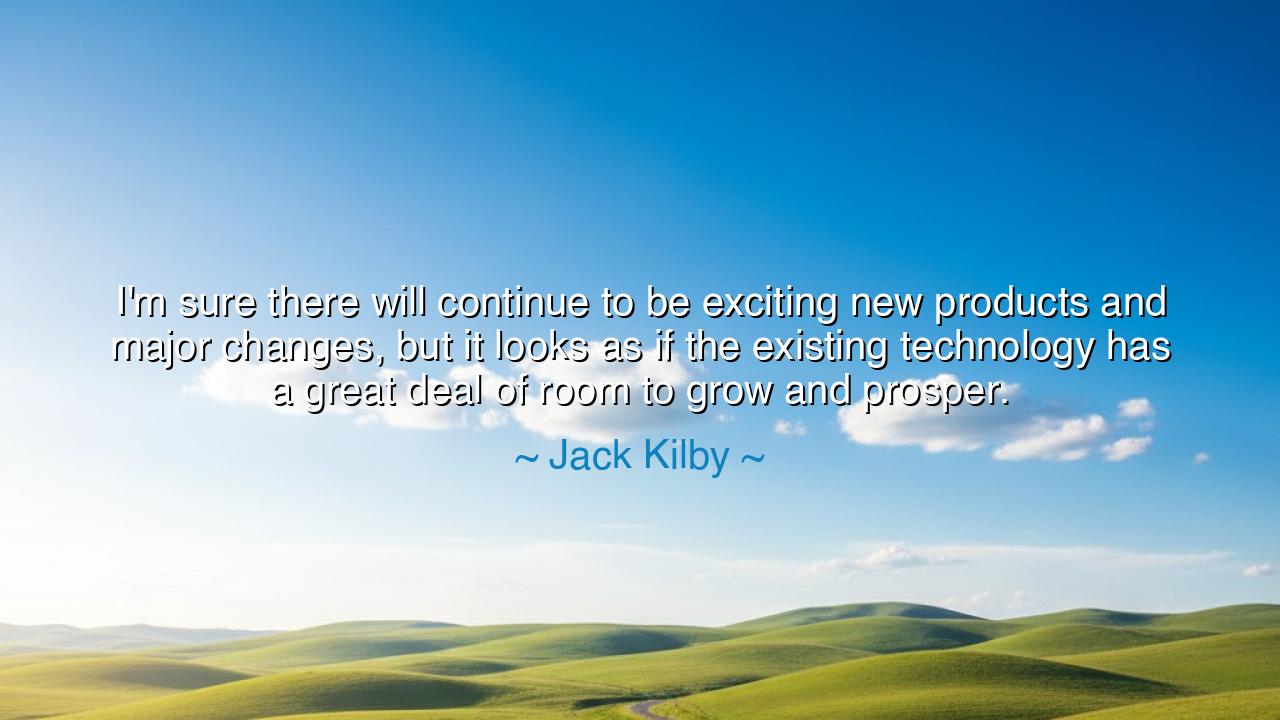
I'm sure there will continue to be exciting new products and
I'm sure there will continue to be exciting new products and major changes, but it looks as if the existing technology has a great deal of room to grow and prosper.






The words of Jack Kilby—“I’m sure there will continue to be exciting new products and major changes, but it looks as if the existing technology has a great deal of room to grow and prosper”—are spoken with the calm vision of a man who helped ignite the modern age. Kilby, the inventor of the integrated circuit, father of the microchip, was no stranger to revolutionary change. Yet here he reminds us that the march of progress is not only in the dazzling new, but also in the patient cultivation of what already exists. The technologies we hold in our hands today are not finished; they are seeds, still capable of unfolding into wonders undreamed of.
The origin of this wisdom lies in Kilby’s own invention. When he first fashioned the integrated circuit in 1958, it was a small, fragile thing, hardly recognizable as the force that would transform the world. In that moment, it was not the “new product” itself that promised greatness, but the vast room for growth within it. From that tiny seed grew the computer, the smartphone, the internet, and nearly every technology that shapes our lives today. Thus Kilby’s words carry the authority of lived truth: existing technology may seem humble, but it holds the power to prosper beyond imagination.
History itself provides echoes of this principle. Consider the steam engine, born in the 18th century. Its earliest forms were clumsy, inefficient, and limited to pumping water from mines. Yet with time, refinement, and patient growth, it became the beating heart of the Industrial Revolution. Railroads, factories, and ships were all born not from new inventions, but from the steady prospering of what already existed. The lesson of both Kilby and history is the same: do not underestimate the power of improvement. What exists already may yet transform the world.
There is also wisdom here for the restless spirit of our own age, which too often hungers only for the shocking breakthrough, the disruptive novelty, the “next big thing.” Kilby counsels us to look not only forward, but inward—to the tools already in our grasp. Often, the path to prosperity is not to discard the old, but to refine it, to stretch its capacity, to explore its depths. The existing foundation is not a limit, but a platform upon which whole new worlds may be built.
And yet, his words do not deny the thrill of discovery. Kilby acknowledges the certainty of “exciting new products and major changes.” He was no enemy of innovation, for his own life was proof of its necessity. But he saw clearly that balance is required: a civilization must pursue both the new horizon and the fertile field already sown. To seek only the new is to risk neglect; to cling only to the old is to risk stagnation. Growth comes by holding both truths in tension—exploration of the future, cultivation of the present.
The lesson for us is clear: do not despise what already lies in your hands. Whether in technology, in work, or in life itself, greatness is often hidden in the soil of the familiar. The phone in your pocket, the skills you already possess, the relationships you already nurture—these are not finished stories, but beginnings. Invest in them, refine them, and you will discover that prosperity often lies not in chasing the unknown, but in unfolding the potential of the known.
In practice, this means patience with the technologies and talents around us. Rather than demanding constant novelty, we should seek to deepen, refine, and master what we already have. It means improving systems rather than abandoning them, nurturing ideas rather than discarding them, and respecting the quiet power of continuity. For just as the microchip grew from a sliver into an empire, so too the tools of today may carry us into tomorrow’s triumphs.
So let Kilby’s words echo across generations: the future is not only in what is yet to be born, but also in what already lives among us, waiting to grow and prosper. The wise do not seek only the fire of invention—they tend also the steady flame of refinement. And in that tending lies the true secret of progress: that the seeds we already hold may one day become forests beyond imagining.






AAdministratorAdministrator
Welcome, honored guests. Please leave a comment, we will respond soon